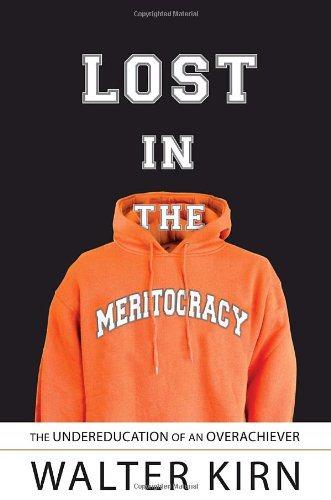
Lost in the Meritocracy
The Undereducation of an Overachiever
کتاب های مرتبط
- اطلاعات
- نقد و بررسی
- دیدگاه کاربران
نقد و بررسی

April 1, 2009
Slapdashmemoir from Time and GQ contributing editor Kirn (The Unbinding, 2007, etc.).
From the moment he aced the SAT at his ruralMinnesotahigh school (he doesn't reveal his score), the author's fate, like those of his fellow overachievers, was sealed."I have…comrades in estrangement," he writes,"way out here on the bell curve's leading edge, where our talent for multiple-choice tests has landed us without even the vaguest survival instructions." Kirn aims to burst the pretensions of the American ideal of meritocracy—astutely analyzed in Nicholas Lemann's The Big Test (1999)—but the narrative is too narrowly focused on the author's personal ascent through the ranks, from elementary school through Princeton and Oxford. Many of his experiences—the desire to leave Middle America and reinvent himself as a respected intellectual; his rage against affluent roommates who expected him to cough up a percentage of the expense of buying high-end furniture; his humiliation after being savaged by jealous, less-talented students in a writing workshop; his cocaine-and-sex binge with the daughter of a wealthy art dealer—make for evocative, entertaining reading, but it's unclear how they advance his argument against the meritocracy. Kirn's strengths are honesty and humor. He admits that he, like many who attend Princeton and other Ivy League schools, was a social climber driven by the desire be a part of the East Coast Elites, not by a hunger for knowledge. He says he faked his way through college, and that enlightenment came after a mental breakdown. Kirn also uses his considerable powers as a novelist to paint vivid scenes of comic debauchery. Some of the drunken, drug-addled escapades are reminiscent of The Ginger Man, but J.P. Donleavy wisely avoided the temptation to cast his antihero'sdrunken recklessnessas a metaphor.
Ill-suited for a book-length work, Kirn's premise found more effective expression as a feature in The Atlantic.
(COPYRIGHT (2009) KIRKUS REVIEWS/NIELSEN BUSINESS MEDIA, INC. ALL RIGHTS RESERVED.)

May 1, 2009
Kirn, a noted book critic and novelist ("Thumbsucker"), writes a memoir of his educational journey, describing his travels from rural Minnesota to the upper echelon of the educational meritocracy, Princeton University. His main point is that "percentile is destiny in America." Kirn says he was able to climb so high not because of any innate gifts or knowledge; rather, he learned to play the game of scoring well on standardized tests, collecting extracurricular activities, and concentrating on class rankings. When he got to Princeton in the late 1970s, he discovered an entire subculture based not on learning and acquiring knowledge but on networking, backbiting, and "parroting" professors' words and pet theories back to themreading assigned books was largely optional. In the end, Kirn's recreational drug use led to a case of aphasia and the need to relearn much of what he thought he knew. This indictment of America's higher education system, particularly of the elite universities, suggests that real learning takes place through experience. It is insightful, well written, and occasionally humorous and would be an excellent choice for all readers. [See Prepub Alert, "LJ" 11/1/08.]Mark Bay, Hagan Memorial Lib., Univ. of the Cumberlands, Williamsburg, KY
Copyright 2009 Library Journal, LLC Used with permission.

April 15, 2009
Calling something irreducible. Searching for a contest, no matter how trifling, that hell be sure to win. These are justtwoof the tricks Kirn used to shuttle himself through high school, Princeton, and on to Oxford, and such soulless maneuvers are what frame this memoir of duping the educational system. Even as a child, Kirn quickly learned that school was not about learning; it was aboutreciting the code words teachers most wanted to heara salient fact that will ring painfully (and shamefully) true to A-students everywhere.This pandering ismost acidly portrayed as eight-year-old Kirn reacts to a teachers declaration that art isnt about drawing dinosaurs, its about emotionleading Kirn to draw a bunch of squiggly lines around his triceratops to indicate feelings. Kirn sprinkles his otherwise finely honed thesis with moretypically memoir-ish recollections, which range from meandering to brilliant, but most of the book plays like a mirror-angle Catcher in the Rye, this time from the point of view of one of Holdens dreaded phonies.(Reprinted with permission of Booklist, copyright 2009, American Library Association.)

























دیدگاه کاربران